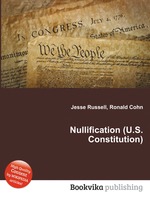Nullification (U.S. Constitution)
Jesse Russell Ronald Cohn
бумажная книга
High Quality Content by WIKIPEDIA articles! Nullification is a legal theory that a State has the right to nullify, or invalidate, any federal law which that state has deemed unconstitutional. The theory is based on a view that the States formed the Union by an agreement (or "compact") among the States, and that as creators of the federal government, the States have the final authority to determine the limits of the power of that government. Under this, the compact theory, the States and not the federal courts are the ultimate interpreters of the extent of the federal government`s power. The States therefore may reject, or nullify, federal laws that the States believe are beyond the federal government`s constitutional powers. The related idea of interposition is a theory that a U.S. State has the right to "interpose" itself when the federal government enacts laws that the state believes to be unconstitutional. A more extreme assertion of state sovereignty is the related action of secession, by which a state terminates its political affiliation with the Union. Thomas Jefferson and James Madison set forth the theories of nullification and interposition in the Kentucky and Virginia Resolutions in 1798.


